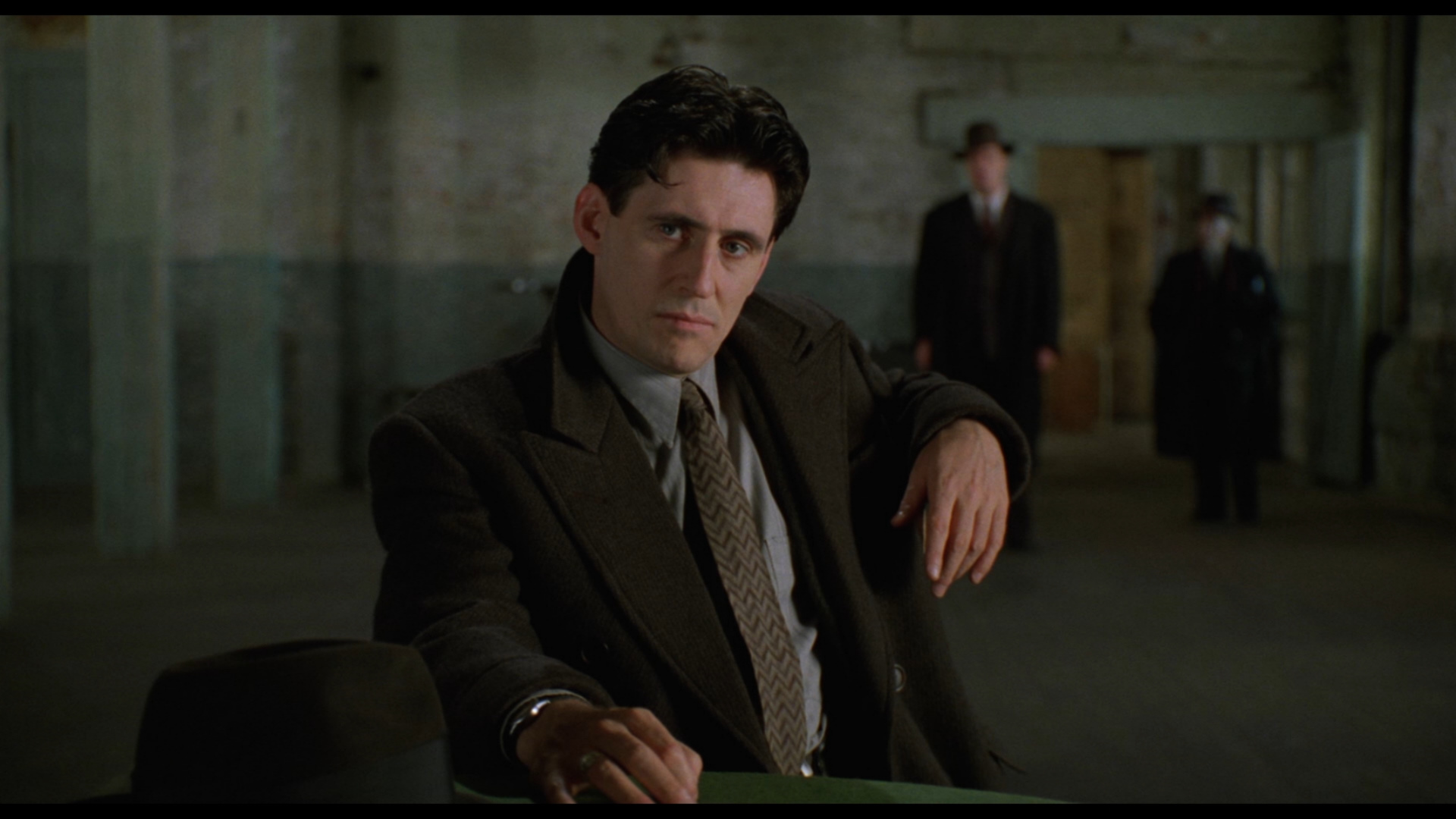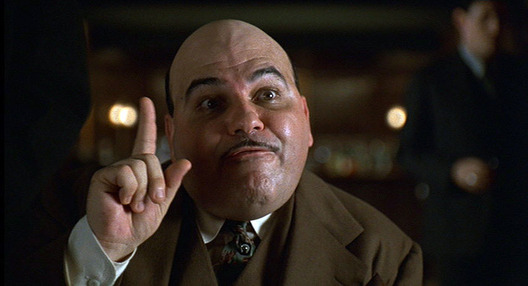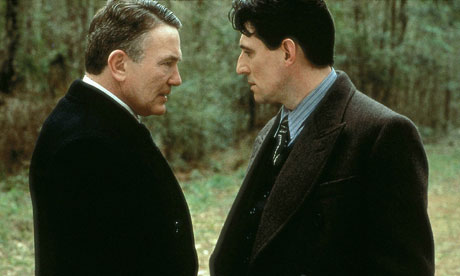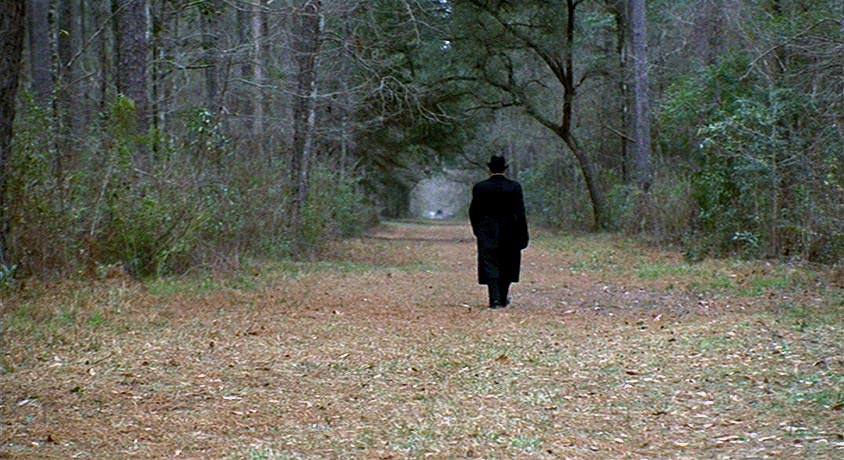By Robby Karol
Miller’s Crossing has always ranked neck-and-neck with The Big Lebowski as my favorite Coen Brothers film. And I think part of that is how both of them take a sideways approach to two of my favorite writers, Dashiell Hammett and Raymond Chandler. If The Big Lebowski is the Coens’ updated version of The Big Sleep, Miller’s Crossing is the Coens’ jaundiced take on Red Harvest (a novel already cribbed from or adapted by Kurosawa, Sergio Leone and Walter Hill). But just as Lebowski has undercurrents questioning American imperialism and capitalism, Miller’s Crossing also has something deeper in mind.
The basic plot of Red Harvest (and Yojimbo and A Fistful of Dollars and even Last Man Standing) is that a man comes to a town divided by two warring gangs and pits both sides against each other. It’s a great formula for a reason. It’s chock full of conflict and it allows the protagonist to play dirty, since both sides would do the same to him and he’s doing this to bad guys. But the Coens complicate this from the start with Miller’s Crossing. Tom Reagan (Gabriel Byrne) isn’t an outsider who wants justice served. He’s a part of the system, already working for Leo (Albert Finney), who treats him with a kind of paternal affection. And secondly, he’s playing the gangs against each other for… well, that’s a good question. It’s not out of a straightforward sense of justice or because it’s his job. He knows the corruption of the town too well to think he can clean it up. And, at the end of the movie, when Leo offers him his job back, he doesn’t want it.
The lure of the Red Harvest plot is that we don’t care about the villains. They can be broadly drawn and cruel. They can be killed with impunity. But Miller’s Crossing undermines that consistently. Johnny Caspar (Jon Polito), the competing gang leader, is the first person we meet in the film, and when we meet him, he’s complaining about ethics. Mind you, he’s complaining about the ethics of someone who ruins his book for a fixed fight, but he’s forming his complaint specifically on ethical grounds. And as the movie goes on, we spend a lot of time with Johnny Caspar. He’s not a nice guy, but he’s a person with a family, someone who has an inner life. There’s a kind of naiveté about him, as he gets his stomach worked up into knots as he thinks about whether his lieutenant could be lying to him. Not just because he’s nervous about being betrayed, but because it throws his worldview into question. And when he gets killed, we just see the ugly aftermath. It doesn’t seem worth it.
For that matter, Leo seems to have “a big heart,” as Marcia Gay Harden’s Verna says. It’s not just the affable bonhomie of a political boss that conceals a calculating heart. He’s so wrapped around Verna’s finger that he won’t give up an unpleasant bookie like Verna’s brother Bernie Bernbaum (John Turturro) to Caspar, even though it is clearly in his best interest. If Caspar is naïve, Leo is a sap who wants to protect those close to him. And in the end, Caspar’s even willing to believe that Tom told him about sleeping with Verna just to make his heel turn more realistic and excuse Tom and Verna’s affair.
Furthermore, the Red Harvest plot relies on the protagonist to play the angles on everyone around them. And while Tom Reagan does just that, the Coens give us moments all along the way to show that people can’t just be treated as puzzle pieces. Not only do people not work like that, it’s impossible for anyone who isn’t a sociopath to do that. And while there are lots of awful people in the unnamed town of MILLER’S CROSSING, they’re still relatable human beings. For that matter, we see how much treating people like cogs in a machine hurts Tom. When we first meet him, he’s already a heavy drinker and a gambling addict. But over the course of the film, we see him forced to become familiar with violent death, drive away the woman he loves and cross his last moral boundary by killing someone. Byrne gives us a man who takes physical pain in stride like the best noir hero, while betraying the fact that he’s slowly dying emotionally with every sin he commits.
But for a movie that traffics so heavily in murder, sin and violent death, the Coens use a variety of techniques to keep us from enjoying the suffering. Every death we see is staged and framed to be grotesque and discomforting. More often we see the corpses in the aftermath, so that we can only see a lifeless body, not a “cool” action sequence. Carter Burwell, who provides the film’s score, composes sentimental, string-laden themes that suggest melodrama. And of course, almost every character has some touch that humanizes them, whether it’s an enforcer who loves to sing opera or a mobster shuddering at the monstrous person who would steal a dead man’s toupee.
Midway through the film, Caspar wonders aloud that after you double-cross someone, there’s no way to know when the double-crosses will end. This vicious mobster then thoughtfully says to himself, “An interesting ethical question.” Perhaps that’s what I like so much about Miller’s Crossing. That in the midst of the generic noir trappings played (fairly) straight, the Coens can still inject their mournful and questioning brand of humanism.
Robby Karol is a film and comic book nerd. He is currently hiding out in the Pacific Northwest with his wife, son and two weird dogs.





Very good piece. I still can’t get over that insane two-minute trek through the woods that John Turturro’s Bernie makes as he pleads for his life with Tom. “We’re not like them! They’re animals!”